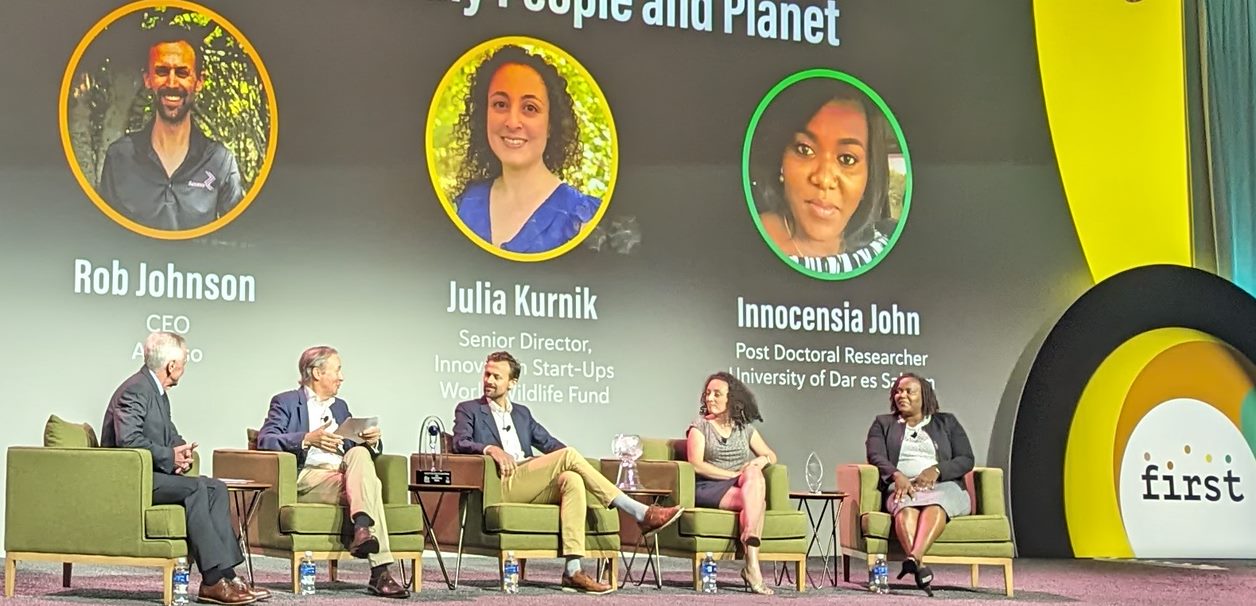Climate change, sustainability, and consumer behavior were key topics at IFT First, the annual conference and expo from Institute of Food Technologists, held July 16-19 in Chicago. This year’s event focused on the theme, “Innovation in a Time of Crisis: Can We Future-Proof the Food System?” As several presenters noted, perhaps the most important follow-up question is: Are consumers willing and able to change?
Aspiration and Reality
Speaking on improving consumer trust, David Lundahl of InsightsNow pointed to his research on primary shoppers throughout the U.S. which found that 47 percent of all shoppers aspire to find products that are more sustainable. However, only 15 percent of shoppers are actually buying more sustainably, due to barriers that include availability of product and concerns about product performance.
In a presentation on ethics and sustainability, Melanie Zanoza Bartelme of Mintel spoke about consumer responses to carbon-neutral claims and quoted research showing that 68 percent find it important that companies engage in these measures, and 40 percent don’t trust companies to be honest about their impact on the environment.
Looking to the Consumer
Despite these findings on consumer concerns, there’s evidence from multiple researchers and food-system thinkers that the consumer is in the forefront as they work to bring new climate-friendly crops and products to market.
Upcycling: In his session “Upcycled Food: Wins, Challenges, and Consumer Acceptance,” Dr. Jonathan Deutsch of Drexel University explained that the World Bank says that by 2050, we will have to scale food production by 50 percent. “Waste is a social construct. If we waste less,” he says, “the challenge is more doable.” He pointed to a key question in his study: will people pay more for upcycled food? “If you say here's a cookie, here's an upcycled cookie, which one do you want? They want the cookie, but what we find is with factual, rational messaging like ‘this reduces food waste’ or ‘this uses products that would otherwise go to waste,’ they will pay more.”
Orphan crops: At IFT First, Dr. Innocensia John of the University of Dar es Salaam in Tanzania was awarded a prize at the second annual Seeding the Future Global Food System Challenge for her research on the economic potential of “orphan crops” like jackfruit, pigeon pea, and moringa in the smallholder farmer system. “These crops are actually packed with micronutrients such as zinc and Vitamin A which are the most prevailing problems in Tanzania currently,” she noted, and her focus is on changing the market by bringing native crops onto consumer tables through education and greater availability, including home and school garden projects.
Insect protein: Dr. Dominic Agyei from the Department of Food Science, University of Otago, New Zealand focused on the nutritional and health impact of edible insects in mitigating food insecurity. “Knowing the benefit of insects as a food source, talking about the nutrition, the high protein, high fat, high levels of minerals, and also even dietary fiber in the form of the chitin in insects is key, along with the environmental footprint.” He acknowledged that consumers may be hesitant, and that the final challenge is to ensure taste, palatability, and safety of the final consumer product.
Cultivated protein and the role of foodservice: During the panel, “Food Tech Innovations That are Changing How the World Eats,” presenters from EAT JUST and Aleph Farms spoke about the importance of reducing costs, increasing availability, and providing high-quality, delicious products with regard to cultivated meat and cellular agriculture. Panelist Carole Sioufi of Branchfood noted the importance of the foodservice channel in accelerating consumer adoption of these new foods, stating, “Foodservice enables feedback with consumers to be able to understand how far we are from an ideal product that consumers will adopt. Foodservice also helps familiarize consumers with these novel proteins. Consumers trust the restaurant, the chef, the operator.”
The founder of the Seeding the Future Global Food System Challenge Bernhard van Lengerich perhaps best summarized the theme of the event in his remarks: “Making healthy food is not really that difficult, but making healthy food that tastes good, is affordable to the consumer, nutritious, and sustainable, it's a high charge.”
Related: Cost Increases Hit Olive Oil Retailers; India's Rice Ban Could Provoke Global Food Crisis.

